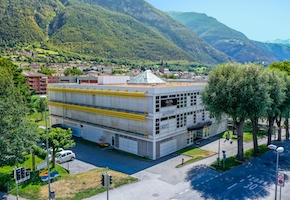- About
- Programs
- Innovation & Research
- Campus Life
- Career Services
- Admissions
- News & Events
- Alumni
What Is the Hospitality Industry? A Beginner’s Overview
Uncover the core elements and significance of the hospitality industry. From emerging trends to exciting career paths, explore what makes this field thrive and where it's headed next.
The hospitality industry refers to the businesses and services that focus on providing comfortable, enjoyable experiences for people away from home.
Thousands of years ago, deep within the Lascaux Caves in France, the local inhabitants began to accommodate visitor tribes, offering food, shelter, and warmth. This early form of hospitality wasn't driven by profit but by a sense of duty. Hospitality was seen as an inherent trait, a way to welcome strangers and build trust.
However, over time, people transformed this practice into an economic activity, giving rise to the vibrant industry we know today. So, what is the hospitality industry? It's the evolution of this ancient tradition, now encompassing a global network of services designed to enhance comfort, convenience, and experiences for travelers everywhere.
What Is the Hospitality Industry?
Do you know that feeling when, after traveling all day, you step into the lobby of a hotel and are greeted with warmth, a friendly smile, and the soft lighting of a place that feels almost like home? That, right there, is the very essence of the hospitality industry.
Indeed, this industry makes sure there's a place to stay or a meal to eat when away from home, but it's also about creating experiences that make people feel comfortable, cared for, and valued. Hence, it is defined as a commercial sector dedicated to delivering services that enhance guest experiences, including accommodation, food and beverage, travel, recreation, and event management.
Main Sectors of the Hospitality Industry
All sectors of the hospitality industry work together and sometimes overlap. It's like a web of connected services that aims to keep the guest's experience smooth and enjoyable.
- Accommodation: Hotels, resorts, and hostels are dedicated to offering guests a comfortable place to relax and recharge.
- Food and beverage: This sector offers dining experiences that bring people together, serving everything from casual meals to exquisite dishes.
- Travel and tourism: Airlines, cruise ships, and travel agencies make traveling smooth, enriching, and filled with opportunities for adventure.
- Recreation and entertainment: Whether it's a concert, casino, or amusement park, this part of the industry ensures that fun and relaxation are always part of the experience.
- Meetings and events: Organizing gatherings like conferences, expos, and corporate retreats, this sector turns venues into dynamic spaces where ideas are exchanged and connections are made.
Your Hospitality Journey Starts Here
Master the art of hospitality management
Key Roles and Functions in the Hospitality Industry
Behind every excellent hospitality experience is a group of professionals working hard to fulfill their guests' needs.
Management
These professionals are responsible for coming up with strategies to make sure that everything runs smoothly. There are two types of managers: general and operations managers.
General managers oversee all aspects of an establishment, coordinating departments like housekeeping, food services, and front desk operations. They are also responsible for decision-making related to improving guest services or streamlining processes.
Operations managers, on the other hand, focus on the day-to-day activities. They're constantly optimizing resources, managing staff, and working to make sure that guest satisfaction remains high.
Service staff
The service staff are considered the face of the industry because they interact directly with guests. Front desk agents, for example, make the first impression, welcoming visitors and addressing inquiries. Chefs create culinary experiences while waitstaff and bartenders ensure that dining goes smoothly. Housekeeping staff, though often working behind the scenes, also play an important role in maintaining cleanliness and comfort, which significantly impacts how guests feel during their stay.
Sales and marketing
The success of hospitality businesses also relies heavily on visibility and outreach, which is where marketing and sales professionals come in.
Marketing teams craft the stories that entice travelers, highlighting what makes a hotel, resort, or event unique. They are also responsible for getting these stories out to potential clients and measuring the effectiveness of their efforts through various channels such as social media, online searches, and digital advertising.
Sales teams, on the other hand, focus on filling rooms, booking events, and driving revenue.
Together, they create packages, promotions, and partnerships that help expand a business's reach and ensure steady occupancy.
Support roles
These professionals don't typically interact directly with guests, but they are still invaluable to running the business.
Finance teams manage budgets and revenue, ensuring the business remains profitable. Human resources support this by handling recruitment, training, and staff well-being, creating a positive work environment that empowers front-line teams to perform at their best. Meanwhile, maintenance staff keeps everything in working order, from repairing equipment to upholding safety standards.
Trends and Innovations in the Hospitality Industry
Trends and innovations in the hospitality industry encompass technological advancements, shifting consumer preferences, and an increasing focus on sustainability and wellness.
Technology is a major force, with nearly half of executives in the global travel and hospitality sector citing new tech as a top priority and 84% of companies now having dedicated teams for digital transformation. From mobile apps improving check-ins and room access—preferred by 73% of hotel guests—to virtual reality tours that offer 360-degree property views, technology in the hospitality industry is completely reshaping the guest experience.
Health and wellness are also at the forefront, with the global wellness tourism market projected to exceed one trillion U.S. dollars by 2030. Travelers are seeking more than just relaxation, with 88% prioritizing fitness and holistic wellness during their stays.
Sustainability continues to gain traction, as more than 80% of global travelers express a desire for eco-friendly travel practices, and over 50% actively seek accommodations with green initiatives. The sustainable hospitality trend reflects a growing awareness of tourism's impact on the environment, with hotel operators adopting energy-saving technologies and eco-friendly certifications to meet the demand.
Challenges in the Hospitality Industry
The hospitality industry is displaying remarkable resilience as it confronts a variety of challenges in 2024. One of the most significant ones is the ongoing labor shortage, with over two-thirds of hotels reporting difficulty in attracting and retaining staff. To overcome this, hotels are offering higher wages and a range of incentives to lure skilled workers into the industry.
Moreover, as hotels integrate more technology to optimize their processes, they are becoming targets for cyberattacks. The shift towards cloud services, mobile apps, and digital payment systems introduces vulnerabilities. Data breaches involving guest payment information, personal details, and booking history can lead to major financial and reputational damage.
Additionally, political uncertainties may introduce potential risks that could affect economic stability and consumer confidence. Pandemics, as recently witnessed around the world, are also a threat. However, it is interesting to note how quickly the hospitality industry rebounded from this temporary setback. Therefore, hospitality businesses should take proactive steps to prepare for these potential shifts in the business environment.
Career Opportunities in the Hospitality Industry
For those new to the industry, entry-level positions are ideal for building a strong foundation of experience and essential skills. Many of these roles don't require formal education, but they do demand excellent customer service and strong communication skills, which are critical in a guest-facing industry. These positions are perfect for getting your foot in the door and learning the ropes.
Some examples of entry-level roles include:
- Housekeepers
- Waiters
- Front desk clerks
- Baristas
- Concierge staff
- Bellhops
- Line cooks
As you gain experience, mid-level roles offer the chance to take on more responsibility and develop leadership skills. These roles often involve managing teams, overseeing operations, or planning events, and they typically require a degree in hospitality management or certifications in areas like event planning, culinary arts, or marketing. If you're ready to step into a leadership role and take your career to the next level, these jobs are a great fit.
Some mid-level roles include:
- Event planners
- Restaurant managers
- Chefs
- Front office managers
- Spa managers
- Banquet coordinators
- Food and beverage supervisors
For those with more specific skills or extensive experience, specialized roles allow you to dive deep into key areas of hospitality. These positions often require a higher level of education, such as advanced degrees or certifications, and focus on optimizing the guest experience, improving operations, or driving strategic decisions.
Examples of specialized careers include:
- Hospitality consultants
- Travel agents
- Marketing Executives
- Revenue managers
- Hotel directors
- Wedding planners
- Sommeliers
- Sustainability managers
And for those who dream even bigger, entrepreneurship in hospitality is always an option. Owning your own business—whether it's a boutique hotel, restaurant, or event planning service—is the ultimate opportunity to shape the guest experience and leave your mark on the industry.
The Future of Hospitality
It's safe to say that artificial intelligence (AI) and automation will continue to shape the future of the hospitality industry. We can expect these technologies to keep streamlining operations and enhancing guest services. Additionally, as virtual reality becomes more sophisticated, we can expect its use to expand, offering guests interactive and engaging experiences before, during, and after their stay.
Sustainability will also remain a trend. With a growing number of travelers prioritizing eco-friendly practices, hospitality businesses will need to adopt sustainable solutions to stay competitive. This will likely involve energy-efficient infrastructure, waste reduction programs, and local sourcing of materials and food.
A World of Opportunities Awaits
The hospitality industry touches every corner of the world, offering endless opportunities for those with a passion for people, travel, and service. Pursuing a career in this industry means entering a field that constantly evolves, where creativity, leadership, and customer service are at the core of every role.
If you're intrigued by the possibilities, there's no better place to start than with a Bachelor of Science in Hospitality Business Management at César Ritz Colleges, where you'll gain the skills and knowledge to thrive in this exciting industry.
Some careers build walls, but in hospitality, we open doors—step through with us!
Frequently Asked Questions (FAQs):
What are the 5 P's of hospitality?
The 5 P's of hospitality are Product, Price, Place, Promotion, and People. These represent the key elements that influence the success of a hospitality business by focusing on the service offered, pricing strategy, distribution channels, marketing efforts, and the quality of staff and customer interactions.
What is a hospitality experience?
A hospitality experience refers to the overall impression a guest has during their stay or visit, shaped by the service, ambiance, and emotional connection created by the staff.
Your Hospitality Journey Starts Here
Master the art of hospitality management



















